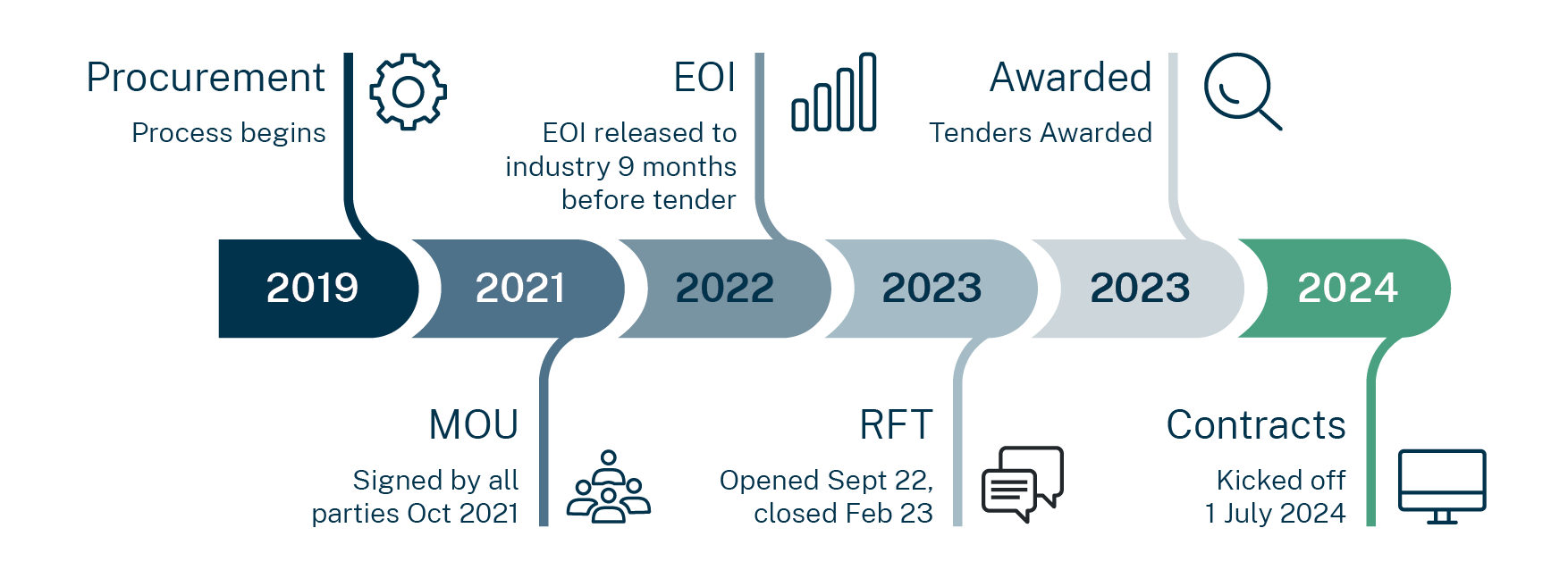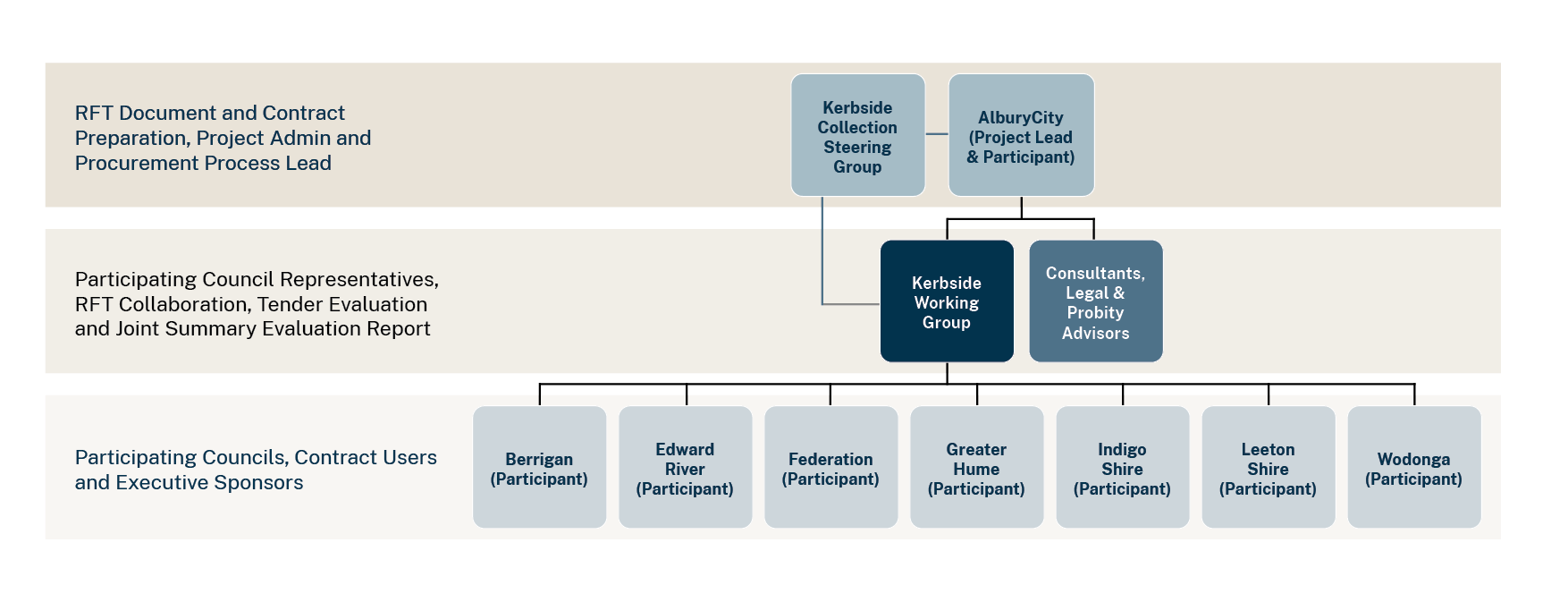Albury Council and the Riverina and Murray Joint Organisation
Eight councils from New South Wales and Victoria jointly procured their kerbside collection and processing services.
Key highlights
- Regional cross-border procurement: Six NSW Councils and two Victorian councils jointly procured for kerbside collections.
- Flexible outcomes: Two different service providers with five councils selected one contractor, while the other three opted for another.
- Innovation opportunities: The program pioneered trials for soft plastics and vehicle software integrations.
- Consistent communication and education: A unified waste and recycling behaviour messaging campaign was implemented across all councils.
- Project management: Albury Council led the project.
Project overview
Six NSW councils —Albury, Federation, Greater Hume, Berrigan, Edward River, and Leeton—and two Victorian councils—Wodonga and Indigo— successfully collaborated to jointly procure kerbside collection services for waste, recycling and organics (FOGO). This initiative leveraged the six councils' existing partnership who who were already directing waste to the Albury landfill. The procurement objectives were to:
- achieve economies of scale
- secure the best prices
- create local jobs.
The differences in NSW and Victorian legislation did not impact the project significantly. The project demonstrated that joint procurement provides significant benefits for regional councils and can be effective, even across state lines.
Project timeline
Led by Albury Council, the joint procurement process began in 2019, with the councils meeting every three weeks for four years. Tender documents were released in September of 2022 and closed in February 2023, with contracts starting July 1, 2024. Following the assessment of tender submissions, Albury City Council’s procurement team developed a comprehensive summary report for each council, providing recommendations for each council on preferred contractors. It was up to each council to choose an option, though the report recommended one preferred supplier to be appointed across all councils.

Implementation
The project started with five councils, all with 12-year contracts due to expire on June 30, 2024. Three additional councils joined during the tendering stage, resulting in a total of eight councils participating in the project for a 10-year term. There was some misalignment of contract expiry dates, e.g. one council had its contract ending later in 2024, requiring an early termination variation.
Attributes in the planning stage that lead to the success of this joint procurement project:
- cross council workshops which fostered shared understanding and collaborative decision-making
- comprehensive data collection to gather essential insights to inform planning the procurement strategy and objectives
- a governance structure (see diagram below) that included a steering committee dedicated to the kerbside services contract
- This structure reflected Albury’s lead role and its resources relative to some of the smaller regional councils and was a key factor in ensuring the project stayed on track and delivered on its objectives.

- expert panels established to offer guidance, oversight, and evaluation throughout the project
- engagement of an industry expert to prepare the food organics and garden organics (FOGO) components of the contract including the specifications whose expertise guaranteed the information was current and ready for market delivery
- continuous engagement through numerous briefing sessions with all participating councils, including mayors, deputy mayors and councillors
- an Expression of Interest (EOI) released nine months before the Request for Tender (RFT) opened proved instrumental in the success of the project
- This proactive step allowed the industry to adequately prepare and provided participating councils with valuable insights into the range of services available and industry's readiness to deliver them, particularly in addressing regional challenges such as distances and infrastructure limitations.
Innovation elements
Key innovations achieved included:
- specifying opportunities to run soft plastic collection trials
- the adoption of advance software in the collection vehicles, motivating contractors to embrace new approaches
- As a result, two new software systems, Echo and j-Track, were introduced to optimise collection and vehicle performance.
- a new contract clause that mandates returning 15% of the generated FOGO back to the participating councils as compost.
- This helps councils to receive tangible benefits from their waste contributions by encouraging the use of locally produced compost within the community (e.g. in schools).
Delivery of consistent waste education
Consistent waste management education and messaging throughout the region was important for all the councils. To achieve this, councils specified the use of uniform signage on all collection vehicles. The use of consistent messages helped with the successful delivery of the 'Halve Waste' education campaign across both NSW and VIC council areas, highlighting another benefit of collaboration in joint procurement projects.
Contract management
As the lead council, Albury committed to continue to support the three councils that opted for a different contractor, while all councils handle their own reporting. Six-monthly meetings with the contractor will be implemented at the start of the contract from July 2024, followed by biannual meetings for the duration of the contract. Councils also have the option to hold additional meetings individually if needed.
Clear and consistent messaging was achieved by allocating community waste queries and requests directly to each individual council's customer service. Contractors are held accountable through benchmarks and performance indicators for issues such as missed bins and noise levels. Failing to meet these benchmarks can result in penalties, as stipulated in the contract. Key Performance Indicators are tailored for each individual council, with data collated by the contractor.
Procurement outcomes
- Five councils—Albury, Wodonga, Indigo, Federation, and Greater Hume—contracted the preferred supplier Cleanaway.
- The remaining three councils—Berrigan, Edward River, and Leeton—chose JR Richards as their contractor (price was a key factor in their decision).
- The tender was structured so that any contractor could bid for either collection or processing of any of the streams. This flexibility suited council interests, while still achieving the benefits of scale and cost efficiency. However, awarding the contract to two different contractors increased the complexity and workload post-award, compared to having a single contractor.
- By 1 July 2024, 75,000 households adopted the new system for the collection of waste, recyclables and FOGO organics.
- Edward River Council transitioned from a single-bin to a three-bin service.
- Harmonisation of kerbside services across the region helps to deliver consistent waste education messages.
- The diversion of organics from landfill has increased, ultimately extending the life of the local landfills, while reducing greenhouse gas emissions and contributing to a circular economy.
Challenges, solutions and tips
|
Challenge |
Solution |
Tip |
|---|---|---|
|
Regular meetings with participating councils |
Establish working groups, identify stakeholders early and bring them along on the journey. |
|
Staff movements challenges:
|
Implement robust knowledge transfer processes, good record keeping, regular training or knowledge sharing sessions, to ensure continuity and clarity even when personnel changes occur. |
Identify project risk early using a risk matrix and discuss and agree mitigation options with steering committee/working groups. |
|
|
Ensure probity and legal advisers are budgeted for and agree division of payments in project plans. |

